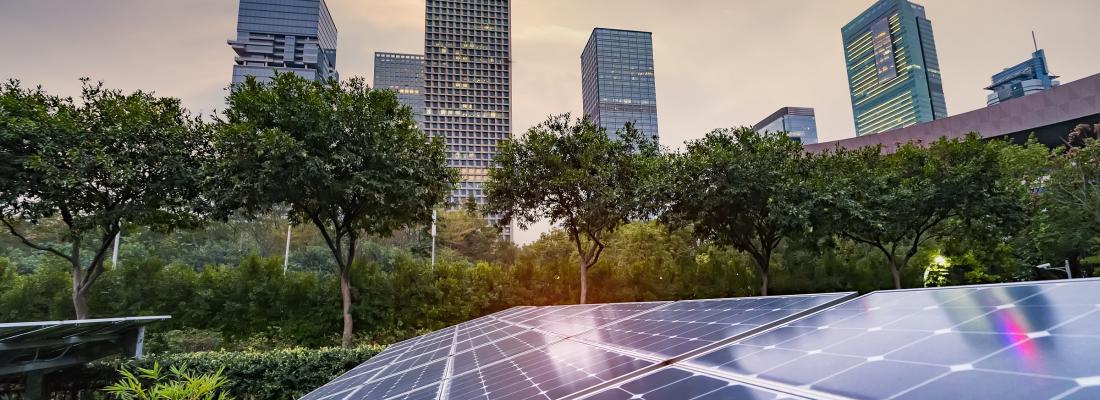Bioeconomy 3 min
Reconciling the development of cities with their environment
If developing cities in harmony with their environment rather than at their expense is the challenge, a more frugal economy based on the sustainable use of living resources and the recycling of organic waste is part of the answer. INRAE has mobilised all its research capacity to re-think the way society produces, processes, recycles, takes territories in account, and helps pave the way to smoother transitions. This transformation must make cities more resilient in the event of upheaval and crises while ensuring sustainable development in the areas they impact.
Published on 02 July 2020

By 2050, close to seven out of ten people will live in an urban zone
Currently, more than half the world’s population live in cities. According to the UN, by 2050 close to seven out of ten people will live in an urban zone, as metropolises continue to gain ground. This trend toward urbanisation, in the North as well as the South, comes hand in hand with denser housing and heightened human activity. This in turn brings considerable challenges in terms of managing waste, wastewater and food supplies, but also water, energy and materials. Within cities, there is the problem of mounting congestion and pollution, which takes a toll on the health and well-being of inhabitants. With climate change, cities will face ever-growing pressure and higher risk when it comes to access to clean drinking water, extreme weather events, and even, in the long term, potential food and energy shortages. The international community and European Union know full well that the stakes are high, and the Covid-19 crisis only served to make the issue hit home on a personal level.
Frugal consumption, smaller environmental footprint, better quality of life
How can cities achieve carbon neutrality by 2050?
When it comes to greenhouse gas emissions, cities are public enemy number one. More and more of them throughout the world, Paris included, have committed to achieving carbon-neutrality by 2050. That is why cities are re-thinking how they are organised and what policies they adopt, taking into account the expectations not only of city-dwellers, but also those who live in surrounding areas who demand that their environments and quality of life see the same improvements. People want to live more mindfully. This means stepping up the recycling of urban waste and wastewater, reducing energy consumption, and turning to renewable energies like biogas. Cities are tailoring their architecture to new needs and adapting urban planning and urban expansion plans to make getting around easier and tap into biomass-based ecosystems and materials. Some cities are also investing in food projects based in territories to lower their environmental footprint and improve the well-being of inhabitants.
Urban transitions in touch with the territories that supply provisions
A large portion of these solutions depends on the bioeconomy and circular economy, and has been accordingly incorporated into European and French strategies. INRAE is a recognised leader in the research that must go further to promote integrated and interdisciplinary approaches that will pave the way to profound change in cities. The bioeconomic transition must be evaluated against several criteria (economic, social and environmental), and at different scales, and requires fresh thinking in terms of technology but also socio-economics and organisation. The transformation concerns not only urban territories but also peri-urban ones which feel the pressure from cities, and beyond that, agricultural and rural zones (what is often called the hinterland of cities) that help supply cities and are in turn impacted by them, for example in terms of pollution and competition for available water resources or space to leave waste and urban effluents. The demographic dynamics of cities, changes in consumption and transport, and choices made in terms of waste, water and energy management, in turn have an effect on sylvoagricultural systems, natural ecosystems and the socio-economic dynamics of these territories. It is in this cross-analysis between urban territories and territories impacted by cities that INRAE’s research primarily lies.
BETTER: research for a bioeconomy in urban territories
Bioeconomic transition of cities
The need for knowledge and innovation is therefore tremendous, because it is a matter of proposing and evaluating solutions, tailored to the specific constraints of territories, that take into account issues raised directly or indirectly by choices made in urban zones. INRAE launched the metaprogramme BETTER, “Bioeconomy for urban territories”, in April 2020 to help research rise to the occasion and overcome stumbling blocks to the bioeconomic transition of cities. The goal is to help cities do three things: achieve carbon neutrality by 2050, contribute to sustainable development goals, and boost resilience in the event of upheaval caused by climate change or other crises. Research carried out within the framework of this metaprogramme focuses on three themes:
- Improve the circular flow and recycling of raw materials, products, waste, nutrients and resources (water and energy) within urban territories and between cities and the countryside while guaranteeing optimal health and environmental security;
- Evaluate the developmental potential and conditions for developing a more bio-based economy (food, materials, energy) that is adapted to the needs and constraints of urban territories;
- Understand, evaluate and help make a smooth bioeconomic transition in urban territories and the zones they influence and impact.
This research mobilises many scientific partners, but also economic and territorial players. As a first step, multi-disciplinary scientific consortia are being financed. These consortia are specifically targeted to INRAE’s research units but may also include other partners. A call for expressions of interest has been launched; the deadline is 30 September. All interested parties should send an email to better@inrae.fr for more information.
* As defined by the United Nations in the Sustainable Development Goals
